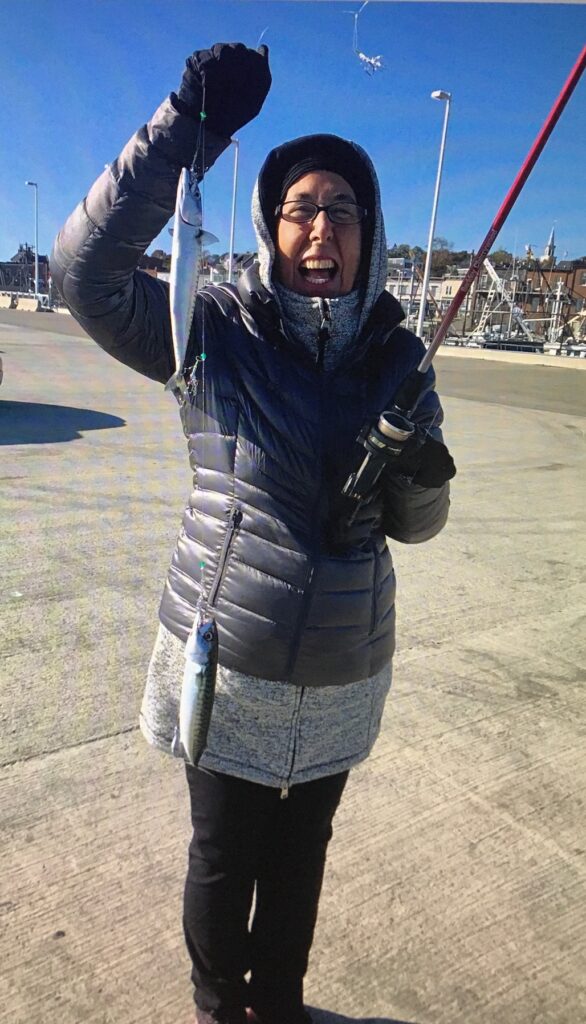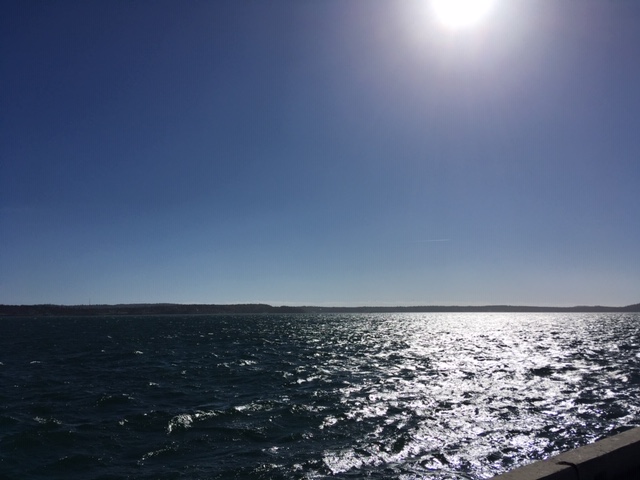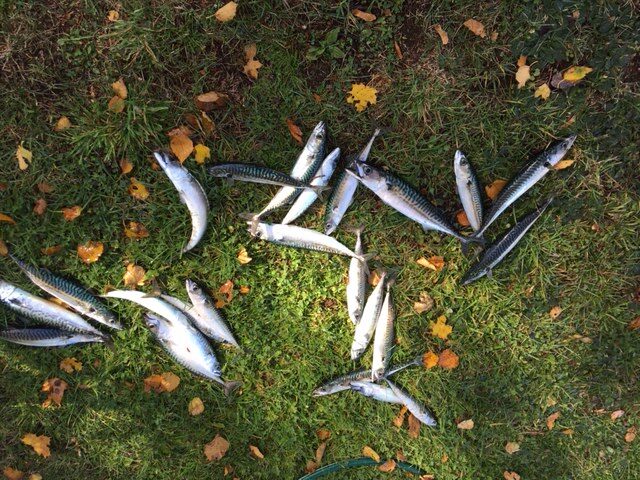In these many months of isolation, I have actually been isolating—and then in a small window of seeming safety, I went fishing, with a friend, for the first time—yup, ever—unless you count all the days I sat by the side of Fish Hatchery Brook up north with small children, small vegetarian children, intent on “fishing.” I was reminded of those extraordinary moments when you are, often unbeknownst to you, shaping other lives. The truth is, however, that years after you figure that out, you will realize that they were shaping yours.
I learned how to cast (not right away and not well, but well enough) and reeled in fish, many fish, small mackerel at the edge of the large pier. And somewhere in the flipping and flinging, the positioning of fingers to stop the line rolling out, the cranking on the reel, the delight at the sun glinting on the flapping fish, I found joy and laughter and light. (Despite the fact that I was killing something. I will wrestle with that thought later.)

FISHING FOR LIFE (originally published in Hip Mama)
What we actually teach our children is not clear until years later when the child is no longer a three-foot-tall, sandy-haired urchin tugging on our pants. See that six-foot, two-inch man over there? That’s the urchin.
I never could have predicted the effect of the days—year after year—when summer sunlight illuminated the water, early under the fire of morning sun, and my children and I balanced poles over Fish Hatchery Brook. It was the stillness we loved, the stillness we still love.
The children have known this from their earliest days tottering on the edge of water and land and sky. That is why we continue to fish. I know you might argue that vegetarians make poor fishers. Actually they rarely fish. Before the days of mothering I might have brought that a step further and said that vegetarians do not make fishers at all.
My middle child, a wiggly one even in the womb, is Buddhist in his fishing serenity.
A quarter-mile from home, Fish Hatchery Brook pools itself in a small eddy just beyond the culvert that crosses our dirt road. Year after year of the town’s old grader smoothing the frost heaves of winter, into the ditches where the land continues and into the brook where it doesn’t, have left us water only three feet deep.
On the hottest of mid-days when the sun slices the sky and beads our bodies with sweat, and these three small children, like most small children, cannot balance the inexplicable crankiness that oozes from their pores, we have walked to the circle of water and flung it into the sky and “oohh”d at the miracle of sunlight piercing each drop over and over again.

We cracked the air with sound. We pounded water. We broke the cold translucent surface with our noses and our lips, held our breaths and blew thousands of bubbles. All with this middle child as naked explorer, staggeringly wild, daring, unable to heed cautions.
But with a pole in hand, he is transformed.
The summer he was three he began to pay attention to the stream’s inhabitants. Tiny brook trout nibbled his toes and slivered the water. And miraculously my son began to stand still, waiting for the fish to wiggle up to his feet.
The summer he was four he began to fish. I can still see him. He readied himself like a man with a mission—hooks; carefully untangled line; a thin sapling branch, later a real pole with eyes and a place for his fingers to curl; and worms dug from the cool pools of earth under rocks and logs.
Long past the time when his older sister and his younger brother chose lying in fields or reading books or racing tiny metal trucks up and down the craggy faces of boulders, this son fished.
As he walked down the dirt road to the fishing hole, his voice steadied itself, then quieted, and finally ceased and became only breath. One normally unable to sit untwitchingly for more than 30 seconds, he waited. And over the years I have waited with him.
I have watched him carefully wrap a nugget of whole wheat bread around his hook instead of the worms he dug and carried to the stream and released to new rock homes on the banks, the process of handling and transporting the worms inexplicably necessary.
Sometimes he caught a trout here or there, but only some times. He released them, except once when it was clear that serious damage had been done, and he insisted that he bring the lone fish to our neighbor.
He tells me now that he was thinking like a fish, diving under the jagged outcroppings of ledge, leaning his bluest of blue eyes between the sedges, scanning the shallow waters, scheming to steal the fleshy bait and survive.
His survival skills are well-honed. I can see that now.
I can see it when he answers the phone, when he says, “I’ll be there,” when he stands with his hand gripping the receiver, when he asks for the car to do something important, when he brings his friend Jimmy to stay the night, quietly telling me that the mom is dying and drinking and mad at everyone.
“I couldn’t stop her from throwing things,” my son says. “From throwing things at Jimmy. From throwing things at me.”
Jimmy is staring out the window, his fingers fiddling with the zipper on his sweatshirt.
“But I could stop him from getting hit,” my son continues. “I could do that.”
I can see it when he dives from a dock, when he runs the soccer ball down a blazed autumn field, when he blends himself into a crowd of unknown others at a college he is visiting, or when he balances on the edge of the just-shoveled roof before he flies up and out into the bank of deep snow we’ve created below. I can see it in his eyes, in the tilt of his body, in the cycle of the moves.
I can see now that when he seemingly throws himself into the belly of life, he has indeed stepped back, swum deep, looked out from another angle, lingered long enough to determine the degree of intensity with which to hurl himself.
He tells me that in all those fishing hours he was feeling the rush of frigid water against his body, and his gills pulsing. He tells me that he was suspending thought and following wherever the motion led him.
Today, I watch him following leads, trusting that through all the false starts and dead ends he will eventually plant his quadruple-E-width feet on the right path.
This year when he flies out from under my wings, he tells me that he will forever remember the silent thoughts we shared on the edge of that shallow stream. He will forever hear my voice trusting his ability to make his own way.
He tells me that he continues to use all of the skills he developed fishing for no fish.
He will forever be free, he says, because in those quiet moments in his still very small world, he learned how to explore where he thought he could not go and to listen to what he thought he could not hear.
And all those years I thought I was just keeping my son* company on some lazy, summer mornings. How could I have known what I was teaching until he figured out what he had learned?
* now a very grown man who continues to follow his path

Discover more from Annaliese Jakimides
Subscribe to get the latest posts sent to your email.